The Collector's Daughter Read online
Page 11
She began to rearrange everything, working one surface at a time. It was slow going but she could lean on her right elbow for balance while lifting items with her left hand. Oh, to be fully ambidextrous again! That would have to be her next goal.
* * *
Dr. Ana Mansour rang in mid-January and Eve hobbled out to the hall to answer the telephone.
“I’m so glad you called,” she said. “I wanted to thank you for the divine lotus flowers, but you didn’t leave an address. I hope you had a good Christmas?”
Ana answered that she had been in London, with friends, and that she was hoping it might be possible to come and talk to Eve again soon.
“Anytime you like,” Eve said. “I’m feeling much better than when you last saw me, so I will have a good stab at answering your questions.”
“I can hear how much your speech is improved. I’m delighted for you,” Ana said.
They agreed on a date to meet just a week later, and Ana said she would bring a tape recorder.
“Will you stay in the room while we’re talking?” Eve asked Brograve later. “Clear your throat or interrupt me if I start to say anything I shouldn’t. I do have a tendency to babble on.”
Brograve agreed that he would hang around in case Eve needed any reminders, but said he was sure she would be fine. Her memories of Egypt were as detailed and vivid as if it had all happened last week, not fifty years ago.
She narrowed her eyes as a thought occurred to her. What if there were things Brograve didn’t know about? Who would help her then?
* * *
Ana was wearing a slate-gray suit this time, with a pair of black platform boots and a black polo neck, a fine silver chain around her neck with an ankh-shaped pendant. As they shook hands, Eve noticed an unusual perfume—sweet and musky—and made a mental note to ask about it later. But then she changed her mind. Her sense of smell had been playing tricks on her since the latest stroke. She kept smelling things that weren’t there: strong smells like onions, or smoke, or iodine. Sometimes she only had to think about something to be able to smell it as clearly as if it were right next to her.
Ana had brought a Sony tape recorder, which she placed on a side table between her and Eve, before slotting in a cassette. She pulled a sheaf of typewritten notes from a briefcase and arranged them in her lap. “Don’t worry,” she said. “These aren’t all questions I’m planning to ask! Just a few facts to remind myself.”
Brograve sat on the other side of the room, by a window, his newspaper open on a table in front of him. He could make the paper last all morning, and by the time he’d finished with it the pages would be out of order and some would be stuck together with marmalade. He was a fastidious man in most respects but his treatment of newspapers always amused Eve.
Ana switched on the machine and began by introducing Eve, explaining that she had been one of the team that discovered Tutankhamun’s tomb in November 1922. That wasn’t quite accurate and Eve opened her mouth to interrupt, but Ana gestured with a raised finger to let her finish.
Once the introduction was over, she asked Eve to confirm that she was happy to answer questions, and Eve said she was always delighted to talk about Egypt and hoped that her contribution would be helpful. Ana played back a section to check that the recording was clear and Eve winced, hating her voice on the tape. She sounded plummy, like the Queen.
“I wasn’t there when the steps to the tomb were first discovered,” she said, to clarify.
“Don’t worry. You’ll have a chance to explain all that later,” Ana replied.
She switched the recorder back on with a click and asked Eve to talk about Howard’s gridblock plan and his conviction that Tutankhamun’s tomb was in the area of the old workers’ huts in the Valley. That was easy. Eve described him showing her and Pups the plan over drinks in Castle Carter, and her strong feeling that he was onto something.
“Do you know when he started excavating under the huts?” Ana asked, her expression encouraging.
“I think it was at the start of the winter 1922 season, around October maybe,” Eve said. “Before that, he came to Highclere and Pups told him that he had run out of money and wouldn’t be able to fund another season.”
“Howard must have been upset to hear that,” Ana commented.
Eve nodded. “He was. He paced up and down the library, as if absorbing the news, then he turned to Pups and said in that case he would fund the season himself, from his life savings. He said if there had been little prospect of success, he would have withdrawn gracefully, but on the contrary, he was so confident of a major find in that area that he was prepared to stake his own money.”
“Interesting,” Ana commented. “There is a theory doing the rounds that he had already started excavating in that area and knew more than he was letting on.” Her look was penetrating. “Perhaps he had even discovered the steps at that stage and that’s why he was so determined to proceed.”
Eve dismissed the idea. “Goodness, no. Howard didn’t keep secrets from Pups. They were thick as thieves. It wasn’t a normal employer-employee relationship; they were friends too. Pups used to stay with him in Castle Carter for weeks on end.” She wondered why Ana would ask that. “If he had already found the tomb, he would have told Pups. But they talked about the money problem over the course of a couple of days and eventually Pups agreed that he would somehow raise the cash for one more season. He couldn’t let Howard risk his own savings.”
“Howard Carter was well-off in his own right, I believe,” Ana said. “He’d taken a dealer’s commission on several major purchases he made for the Metropolitan Museum in New York, and other museums too. He was quite the businessman.”
“I suppose he was,” Eve said. She glanced at Brograve but he shrugged. He didn’t know any more than she did about Howard’s financial affairs.
“So . . .” Ana consulted her notes. “He went back to Egypt and you received a telegram from him on the sixth of November, saying that he had made a ‘wonderful discovery,’ I think that was the phrase.”
Eve smiled. As long as she lived, she would never forget the thrill of that moment.
* * *
She and Pups were eating breakfast when the butler brought in the telegram. As he handed it to her father, Eve’s heart skipped a beat. During the war years they had dreaded receiving telegrams, in case they brought news that Porchy had been injured—or worse.
Her father tore it open and read, his expression changing from concern to—could it be amazement? He looked at Eve, then back at the telegram.
“Good god!” he exclaimed. “It’s from Howard!”
“What is it?” She could tell it was good news before he spoke.
Pups read it out: “‘At last have made wonderful discovery in the Valley; a magnificent tomb with seals intact; have preserved for your arrival; congratulations. Carter.’”
Eve dropped her fork, her eyes filling with tears. “This is it. This is what Howard has been longing for. Can I read it?”
Eve took the telegram and read the words for herself. “Seals intact.” Who knew what might be inside? The Ancient Egyptians wouldn’t have sealed an empty tomb. Her mind was running wild with possibilities. Could it be Tutankhamun’s?
“I’m going to reply that we’re on the way,” Pups said. “You’re coming with me, aren’t you, Eve?”
“You bet I am!” she cried, spilling some tea in her enthusiasm.
They threw clothes into steamer trunks and set off in the car for London to catch the boat train. She couldn’t wait to be in the heat and dust of the Egyptian desert, to see with her own eyes whatever it was that Howard had found.
* * *
Frustratingly, the trip to Egypt took longer than usual. They had to wait in Marseilles for a steamer going to Alexandria, and then it was a slow one that stopped in every port around the south of Italy, then Greece. Eve strained her eyes for a view of the North African coast, and when they disembarked on the twenty-third of November, seventeen
days after receiving the telegram, she hustled Pups straight to the train station. They had cabled their arrival time to Howard and, as the train crawled into Luxor station in the early evening, Eve looked out the window and saw him pacing up and down the platform in a brown homburg and a crumpled beige suit.
As soon as they got off the train, he hurried across and began telling them the story, so eager that the words came out in a rush.
“A young waterboy called Hussein tripped over something solid in the sand. On examination, it turned out to be a step,” he said. “We excavated and found a staircase leading down from it. Of course, it could be a tomb that was built and never used. Or it could have been looted in antiquity and the seals cleverly resealed.”
Eve had never seen him looking so excited. “You wouldn’t have sent that telegram if you didn’t think it was significant. And I know you; you don’t get excited over nothing.” He grinned, and she could tell he was optimistic. “Any sign of a name?” she asked.
“I’ll show you in the morning,” he said, refusing to be drawn further no matter how much she pestered him.
While they were speaking the sky had turned copper and the stars were appearing. Day transformed to night fast in the desert, as if someone had turned off a light switch. A solitary bat glided past.
“Can’t we leave our trunks at the hotel and go straight to the Valley now?” Eve asked, consumed with impatience. “I’m never going to be able to sleep.”
“We old men don’t have your energy, Eve,” Pups said. “I need to rest after the journey.”
She glanced at Howard, wondering how he felt about being called “old.” He was eight years younger than Pups, only in his late forties.
“I’ll meet you first thing in the morning. Five a.m.,” Howard said. “Keep your hair on till then, youngster.”
Chapter Nineteen
Valley of the Kings, November 24, 1922
Dawn was only the faintest streak on the horizon when Eve and her father walked down to the shore of the Nile and woke a man who was sleeping in his felucca, motioning that they wanted to cross. He leaped to raise the sail and whisked them over the shadowy water in no time. A solitary donkey cart driver beckoned and seemed to know without being told that they were heading for the Valley. A heavy mist hung in the air, making it feel ghostly, and Eve shivered in the chill.
Howard was standing at the Valley entrance with Pecky Callender, a young English assistant he had hired. They walked to the concession and Eve saw a huddle of Egyptian boys, eyes huge and dark in the pinky-gold light of approaching dawn. Howard introduced her to Hussein, the water boy responsible for the find. Like the other workers, he was dressed in the long white tunic they called a thawb, over some loose white trousers. She shook his hand warmly, congratulating him effusively, although it was clear he didn’t understand a word she was saying.
“How old is he?” she asked.
“Eight,” Howard told her, and Eve raised her eyebrows. It seemed terribly young to be working.
After they found the staircase, Howard had ordered his workers to pack it with rubble in order to protect it from looters, so their first job was to unpack it again. Eve helped, passing smaller rocks back to the boys behind her. The sun rose above the horizon and suddenly the temperature leaped from cool to sweltering. A long sand-colored lizard arranged itself on a flat stone nearby to absorb the heat, so still and well camouflaged that Eve could only tell it was there when it blinked.
A plastered doorway emerged at the foot of the stairs and Howard beckoned for Eve and Pups to come and look.
“Do you see this seal?” He pointed. “The bird is the ‘u’ sound, and that’s the symbol of an ankh.” He pointed to each syllable as he spoke. “Tut. Ankh. Amun.”
“Howard! You rogue!” Eve punched his arm. “You’re so secretive! Why didn’t you tell me last night?” She peered at the other seals. “What does this one say?”
“That’s a jackal guarding nine captives. It’s a common protective seal in official tombs.”
“So this looks genuine?” Pups asked, his voice hoarse. Eve had a pang of worry about him. He seemed very tired from the journey.
“It does. But look.” Howard pointed. “The seal in the top left corner has been broken and replastered, on what looks to me like two separate occasions.” He traced it with his finger. “The materials used indicate robbers entered in antiquity, but I can’t see any sign of a modern robbery.”
“Are you sure?” Pups replied. “That’s rather good news, isn’t it?” The men exchanged glances.
“Let’s take some photographs,” Howard said, and there was a delay while Pecky Callender set up the camera on a tripod and took the shots.
“What now?” Eve asked, when he had finished.
“Now we break through,” Howard told her, with a grin. He stopped to swig from a stone water bottle, then signaled to the Egyptians to use their picks on the plaster surface.
Eve held her breath, hoping a treasure-filled tomb would appear right there in front of their eyes, but instead they came upon a long downward-sloping corridor packed full of limestone chips. After examining a few, Howard told them the chips dated from antiquity. The corridor would have to be excavated very slowly and carefully in case anything was preserved within.
“How long will it take?” Eve asked, hopping from foot to foot.
“A few days,” he replied, and she tutted her impatience.
Pups chuckled. “When you were younger, I tried to teach you that anticipation of a treat could heighten the pleasure, but I see that lesson didn’t sink in.”
On the contrary, Eve remembered arguing to be allowed to open her birthday presents the day before so she could spend her entire birthday playing with them. It was an argument she never won.
* * *
At four in the afternoon on November twenty-sixth, the excavators finished clearing the corridor and came upon a second plastered-over doorway, this one engraved with more oval seals. Eve recognized the Tutankhamun ones from the bird and the ankh shapes.
Howard used a small pick to chip a hole in the doorway. “Don’t get your hopes up,” he warned as he worked. “We might find yet another long corridor beyond. The Egyptians designed these tombs specifically to confuse intruders.”
Once the hole was big enough to admit a man’s hand, Pecky Callender lit a candle and passed it to Howard. Pups and Eve huddled close as he inserted it through the hole and waited a moment before pulling it out. The flame was flickering and sputtering but still burning.
“We always have to test for foul gases,” Howard said in response to Eve’s questioning look. “But this seems safe. It didn’t extinguish the flame.”
Pecky handed him a small battery-powered torch and he pointed it through the aperture, then leaned his face against the rock, his eye to the hole. Eve stood on tiptoe, straining for a glimpse, scarcely breathing in her longing to know what lay within.
“Can you see anything?” Pups asked.
There was a long pause. Why was he taking so long? Was it empty?
When he spoke, Howard sounded utterly awestruck: “Yes. Wonderful things.”
Eve’s skin prickled from the top of her skull right down her spine, and she gave a little skip.
Howard widened the hole, then stepped back so they could each take a turn to peer through. Pups went first, and he exclaimed, “Good god!” After a minute or so he turned and handed the torch to Eve, an expression of incredulity on his face.
She poked the torch through the hole, leaned her face against the stone, and looked inside. At first it was fuzzy but when her eyes grew accustomed to the dimness, she saw a jumble of golden objects, some strange animal heads, and lots of shadowy shapes that she couldn’t identify, all heaped up together. It looked like a picture of Aladdin’s cave in a child’s storybook. She shivered.
“Can we go inside?” she asked, turning to Howard.
Pups and Howard glanced at each other and Howard shook his head. “The Egyptian a
uthorities have to be here before we go any farther,” Howard said, looking around at the workmen who were clustered behind. “It’s a legal requirement. I’ll ask the men to fit a gate across the doorway, to keep it secure, then I’ll telegram Pierre Lacau, the director of antiquities in Cairo.”
“How long will it take for them to get here?” Eve asked, feeling as if she might burst if it were more than an hour or so.
He shrugged. “A few days, I imagine.”
“Days!” she squeaked, her voice rising to a high pitch. “How can we possibly wait for days?”
Her father laughed. “We’ll manage somehow.”
Eve sat on a rock to watch as they used a clay-type mud to seal the hole Howard had made, then fitted an iron gate across the doorway, drilling into the bedrock so it was held securely. It was early evening when Pecky Callender headed off to his hotel, while the Egyptians went to their homes for the night. Howard, Pups, and Eve got a donkey-cart driver to take them to Castle Carter, feeling a mixture of frenzied excitement and crushing anticlimax.
* * *
“We still had no idea what we had found,” Eve told Ana Mansour. “As I’m sure you know, it was three days later, the twenty-ninth of November, when the official opening took place. Do you want me to describe that as well?”
“No, not yet,” Ana replied. “Let’s retrace your steps. First of all, I want to ask how closely you examined the doorway into the antechamber? Can you vouch for the fact that the seals were intact? I ask, because some of my colleagues suspect that Howard Carter might have entered before the official opening.”

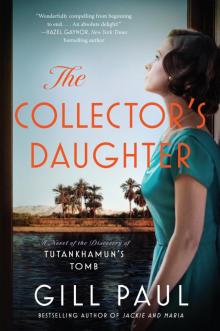 The Collector's Daughter
The Collector's Daughter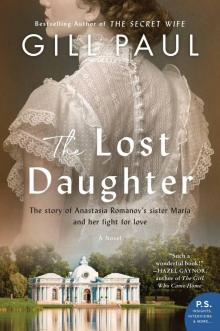 The Lost Daughter
The Lost Daughter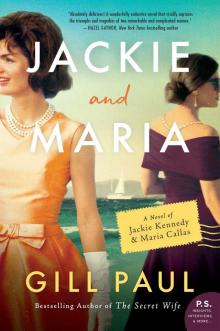 Jackie and Maria
Jackie and Maria The Affair
The Affair Love...Maybe
Love...Maybe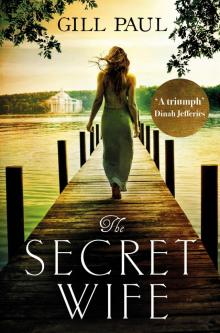 The Secret Wife
The Secret Wife No Place For a Lady
No Place For a Lady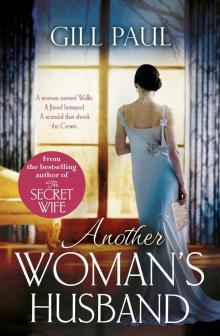 Another Woman’s Husband
Another Woman’s Husband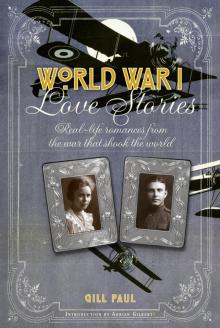 World War I Love Stories
World War I Love Stories World War II Love Stories
World War II Love Stories